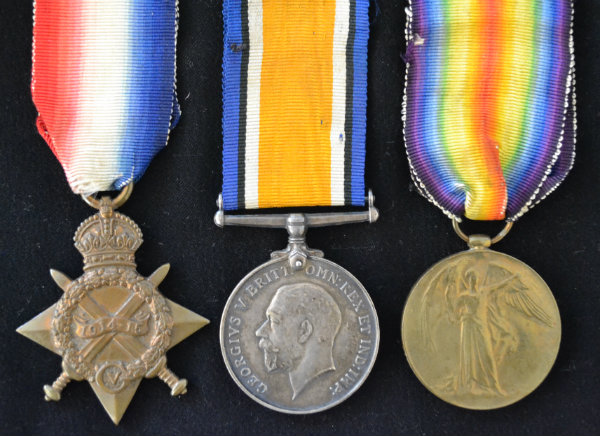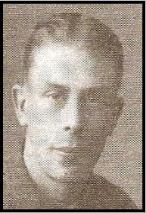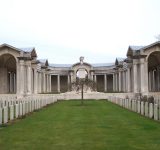Personal Details
Born in Whitchurch in 1891, the second son (and youngest of seven children) of Harry and Susan Bruckshaw of 85, Talbot Street, Whitchurch.
Husband of Phoebe (nee Holiday) Bruckshaw, of Hyde, Cheshire (His widow Phoebe later remarried her cousin and became Mrs Holliday, dying in 1972)
In 1912, Horace left Whitchurch and moved to Hyde in Cheshire, living at 28 Union Street, Hyde, Manchester where he became assistant manager, in charge of the Carding Department at Ashton’s Middle Mill. He enlisted in September 1914. He served first in Gallipoli, and later in France
Military Details
Regiment : 2nd Battalion, Royal Marine Light Infantry
Rank : Private
Service Number : Ply/229(S)
Killed in Action; France 28th April 1917 Age 26
Horace is commemorated on his parents' gravestone in the Congregational Chapelyard, Dodington, Whitchurch.

The 1914 Star (also known as 'Pip') was authorised under Special Army Order no. 350 in November 1917 and by an Admiralty Fleet Order in 1918, for award to officers and men of the British and Indian Expeditionary Forces who served in France or Belgium between 5 August and midnight of 22–23 November 1914. The former date is the day after Britain's declaration of war against the Central Powers, and the closing date marks the end of the First Battle of Ypres.
The 1914–15 Star (also known as 'Pip') was instituted in December 1918 and was awarded to officers and men of British and Imperial forces who served against the Central European Powers in any theatre of the Great War between 5 August 1914 and 31 December 1915. The period of eligibility was prior to the introduction of the Military Service Act 1916, which instituted conscription in Britain.
The British War Medal (also known as 'Squeak') was a silver or bronze medal awarded to officers and men of the British and Imperial Forces who either entered a theatre of war or entered service overseas between 5th August 1914 and 11th November 1918 inclusive. This was later extended to services in Russia, Siberia and some other areas in 1919 and 1920. Approximately 6.5 million British War Medals were issued. Approximately 6.4 million of these were the silver versions of this medal. Around 110,000 of a bronze version were issued mainly to Chinese, Maltese and Indian Labour Corps. The front (obv or obverse) of the medal depicts the head of George V. The recipient's service number, rank, name and unit was impressed on the rim.
The Allied Victory Medal (also known as 'Wilfred') was issued by each of the allies. It was decided that each of the allies should each issue their own bronze victory medal with a similar design, similar equivalent wording and identical ribbon. The British medal was designed by W. McMillan. The front depicts a winged classical figure representing victory. Approximately 5.7 million victory medals were issued. Interestingly, eligibility for this medal was more restrictive and not everyone who received the British War Medal ('Squeak') also received the Victory Medal ('Wilfred'). However, in general, all recipients of 'Wilfred' also received 'Squeak' and all recipients of The 1914 Star or The 1914/1915 Star (also known as 'Pip') also received both 'Squeak' and 'Wilfred'. The recipient's service number, rank, name and unit was impressed on the rim.
Further Information
Report in the Whitchurch Herald 19th May 1917 regarding the death of Horace Bruckshaw
"Horace Bruckshaw killed in action April 28th 1917. He joined soon after the war began in the Autumn of 1914, and has seen over two years of very strenuous fighting, with two intervals of illness from fever. He was recommended the Distinguished Conduct Medal for his bravery in the Dardanelles, and after leaving Gallipoli, he was drafted to Salonica and later to France via Marseilles.
During this time he had one weeks leave, arriving home just before Christmas 1916, when he married Phoebe Holliday in Stockport Cheshire"
Whitchurch Herald 20th January 1917
Taken from Forces War Records
If you can provide any further information on Horace Bruckshaw please get in touch by leaving a comment below, using our Contact Form or by calling in to Whitchurch Heritage Centre.
Information provided by Terry Evanson Whitchurch, Shropshire and Whitchurch Museum and Archives


